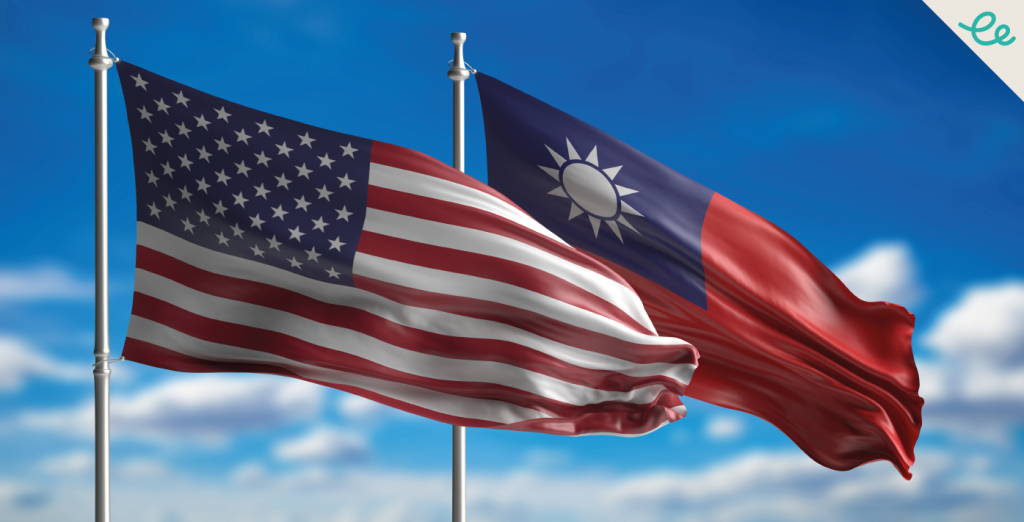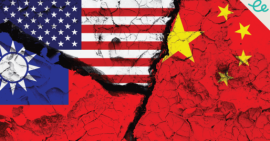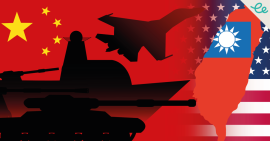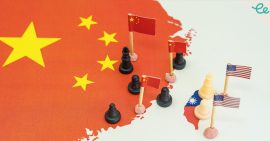Beijing launches massive war games and cancels Sino-US talks
“Welcome to China!” With those three words, or some six Chinese characters, the PRC might have landed a PR masterstroke just as US Speaker of the House Nancy Pelosi touched down in the ROC on 2 August for a fleeting but highly consequential Taiwan visit, one that US President Joe Biden, let alone Beijing, didn’t want her to make.
Hunkered down in Zhongnanhai’s Situation Room (one imagines – Beijing doesn’t release White House-style crisis photographs), Xi Jinping ignored Twitter users’ free advice and jokes about managing Sino-US relations. Instead, China’s Party boss and commander-in-chief had his military and foreign ministry go big on outrage, to warn the US against supporting “Taiwanese independence”, and to remind the island’s residents that his Party will never let them go.
China had warned of “serious preparations” ahead of Pelosi becoming the most senior US official to visit Taiwan (officially the Republic of China) since then-Speaker Newt Gingrich in 1997. She went ahead anyway, so Beijing responded with “stern countermeasures” that risked deadly accidents and make US-China relations even hotter to handle.
Bigger-than-ever war games from 4-7 August threaten a dangerous new normal of Chinese missiles launched directly over Taiwan and more frequent, aggressive military exercises. Taiwan had to cancel airline flights as the mainland fired dozens of ballistic missiles near and directly over the island. Combined with record-breaking numbers of PLA warplanes and vessels crossing the median line that divides the strait, Beijing mounted a simulated blockade of Taiwan.
“China’s practice is in line with international law,” claimed a foreign ministry spokeswoman, who rejected suggestions the drills were dangerous, and blamed the US for Cross-Strait tension. Foreign Minister Wang Yi called Pelosi’s visit, a “manic, irresponsible and highly irrational” action by the US.
The drills “are a significant escalation in China’s efforts to change the status quo. They are provocative, irresponsible and raise the risk of miscalculation,” responded a White House spokesperson. Yet on Chinese social media, state-backed fury at Pelosi’s visit quickly curdled into frustration at the perceived meekness of Beijing’s response, and the lack of military action footage.
Beijing’s diplomatic offensive included the suspension of climate talks, one of few areas where the rivals had managed to keep talking; the cancellation of future phone calls and meetings between Chinese and US defence leaders; the cancellation of annual naval meetings; the suspension of cooperation on the repatriation of illegal immigrants, legal assistance on criminal matters and combatting transnational crimes.
Antony Blinken
US Secretary of State Antony Blinken said shutting down contact on climate change “doesn’t punish the United States – it punishes the world…The world’s largest carbon emitter is now refusing to engage on combatting the climate crisis.” Despite China’s actions, Blinken said he told Wang Yi in Cambodia, where they both attended an ASEAN meeting, that the US didn’t want to escalate the situation, and will “keep our channels of communication with China open with the intent of avoiding escalation to the misunderstanding or miscommunication.”
Will those channels now fall silent for weeks and months? On 28 July, Xi and Biden held a video call where plans were discussed about arranging a face-to-face meeting for the first time since Biden took office. Don’t expect that sit-down anytime soon.
In turbulent times, Xi is building a security fortress for China and himself, wrote Chris Buckley and Steven Lee Myers in the New York Times.In Taiwan, Covid, “colour revolutions” and China’s classrooms, Xi sees threats everywhere that foreign forces can exploit, and has enlisted the whole nation to defend against them.
‘’Grey-zone’’
The growing headaches for Washington include China’s vast range of “grey-zone” tactics, short of war, to pressure Taiwan and undermine US support for the island, most of which Washington will find hard to counter without risking an open conflict, warned Minxin Pei. Pre-emptive diplomacy is the only option to prevent a future crisis, with “pragmatism and restraint from all sides…however difficult it may be politically.
Yet the Pelosi visit “will lock in the hardest-line thinking in China, and really remove any place for advocacy of patience and caution,” the Asia Society Policy Institute’s Danny Russel told the BBC.
For the past year the Biden administration has talked of wanting to ensure there are “guardrails” in the bilateral relationship, so competition doesn’t spill over into conflict. Taiwan has raised “an issue of credibility”, said Asia specialist Bonnie Glaser. “I do think that Xi Jinping will feel that he cannot take Joe Biden’s word.” What’s needed, she said, is a “focused, quiet, candid dialogue” beyond the standard ambiguity, and clearly spelling out red lines.
A watching world can hope that happens on the sidelines of the G20 summit in November. And that Taiwan tensions don’t further escalate beforehand. The stepped-up sabre-rattling is “another stark reminder that this is a conflict that’s not out there in the future or some abstract thing that may or may not happen,” Lyle Morris, a former US Defense Department official, told Foreign Policy. “The potential for a conflict is much higher than we all thought, at least the timeline.”
The Chinese military has just tested, in a very real-world situation, whether Beijing can actually blockade Taiwan, added Craig Singleton, a former US diplomat. “The PLA right now is figuring out how much gas and food are being consumed and how stable the communications systems are while everyone else is counting missiles.”
The dangers are clear and present. “You’re one miscalculation away from what could turn into quite a serious crisis if one of those missiles that overflew Taiwan hit something by mistake,” said Singleton.
Related Articles:
China and US: Risks Persist That Cold War Turns Hot
Sharpen those quills: US sells “porcupine” Taiwan $19bn of arms (2017-2022) (Infographic)








